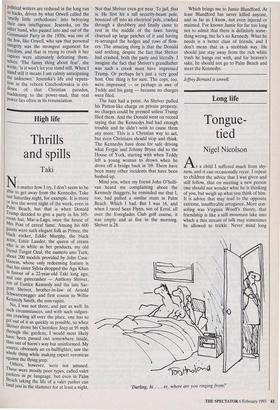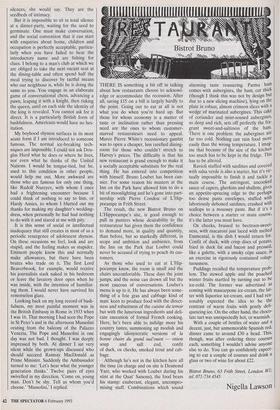Long life
Tongue-
Nigel Nicolson
As a child I suffered much from shy- ness, and it can occasionally recur. I repeat to children the advice that I was given and still follow, that on meeting a new person one should not wonder what he is thinking of you, but weigh up what you think of him. It is advice that may lead to the opposite extreme, insufferable arrogance. More con- soling was Virginia Woolf s theory, that friendship is like a still mountain lake into which a thin stream of talk may sometimes be allowed to trickle. Never mind long 'Darling, hi . . . er, where are you ringing from?' silences, she would say. They are the seedbeds of intimacy.
But it is impossible to sit in total silence at a dinner-party, waiting for the seed to germinate. One must make conversation, and the social convention that it can start with enquiries about home, children and occupation is perfectly acceptable, particu- larly when you have failed to hear the introductory name and are fishing for clues. I belong to a man's club at which we are obliged to take the next vacant seat at the dining-table and often spend half the meal trying to discover by tactful means who our neighbour is, while he is doing the same to you. You engage in an elaborate game of conversational chess, advancing a pawn, leaping it with a knight, then risking the queen, until on each side the identity of the king is revealed. You cannot ask for it direct. It is a particularly British form of bashfulness. Americans would have no hes- itation.
My boyhood shyness surfaces in its most acute form if I am introduced to someone famous. The normal ice-breaking tech- niques are impossible. I could not ask Dou- glas Hurd what he does or where he lives, nor even what he thinks of the United Nations. I would be tongue-tied, but he, used to this condition in other people, would help me out. More awkward are those who are famous for only one thing, like Rudolf Nureyev, with whom I once had a frightening encounter because I could think of nothing to say to him, or Hardy Amies, to whom I blurted out my thanks for making my daughter's wedding- dress, when personally he had had nothing to do with it and stared at me with pity.
It is this sense of social or intellectual inadequacy that still creates in most of us a periodic resurgence of adolescent shyness. On these occasions we feel, look and are stupid, and the feeling makes us stupider. Eminent people know this and normally make allowances, but there have been brutes who trade on it. The first Lord Beaverbrook, for example, would receive his journalists stark naked in his bedroom or leave the lavatory door open when he was inside, with the intention of humiliat- ing them. I would never have survived his remorseless glare.
Looking back on my long record of bash- fulness, my most painful moment was in the British Embassy in Rome in 1933 when I was 16. That morning I had seen the Pope in St Peter's and in the afternoon Mussolini orating from the balcony of the Palazzo Venezia. The Pope and Mussolini in one day was not bad, I thought. I was deeply impressed by both. At dinner I sat very silent while the grown-ups discussed who should succeed Ramsay MacDonald as Prime Minister. Suddenly the Ambassador turned to me: 'Let's hear what the younger generation thinks.' Twelve pairs of eyes swivelled in my direction. 'Come on, young man. Don't be shy. Tell us whom you'd choose.' Mussolini,' I replied.























































 Previous page
Previous page